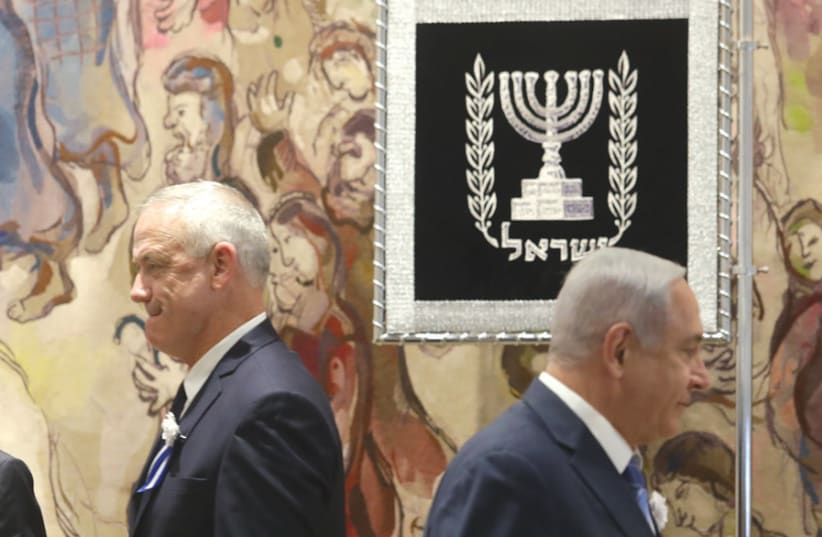Interactive exit poll results not displaying correctly?President Reuven Rivlin said midday on Tuesday that he would coordinate with the Central Elections Committee when to begin consultations with the factions that crossed the 3.25% electoral threshold in order to determine who should form a government.Netanyahu spoke to leaders of Yamina, United Torah Judaism and Shas, and told them he still wants to form a right-wing coalition.Likud ministers Miri Regev, Haim Katz and Amir Ohana reacted immediately by saying that despite not achieving his goal of 61 seats for his bloc, according to the exit polls, he would not be deposed as leader of Likud.Regev urged caution at the Likud’s main event in Tel Aviv, where the mood was dour.“Let’s wait for the real results,” she told a gaggle of reporters. “We saw gaps between the exit polls and the real results in the last election. Then we’ll know the situation. In 2009, Kadima was the biggest party, but [its leader Tzipi] Livni couldn’t form a government.”MK Miki Zohar, a close ally of Netanyahu, said Likud “won’t give up on our natural partners,” meaning the other right-wing parties, but said that whether Netanyahu can form a coalition may “depend on the decisions of the other side and not us. We do not disqualify other people the way they do,” he added, after three months of negative campaigning. “We want to unite people.”Likud MK Yoav Kisch said “it doesn’t look good,” but expressed hope that Likud would fare better in the real results.“I don’t see Gantz being able to form a government, either, so it’ll either be Netanyahu or a third election,” Kisch posited.The Likud’s event in Expo Tel Aviv had countless members of the media from Israel and around the world commenting on the results, but few of the party’s politicians or activists were present to watch the exit polls come in, leaving the hall mostly empty.Both large parties planned relatively subdued events, as Netanyahu and Gantz sought to avoid the gaffe after April’s election when Gantz declared victory, but the right-wing bloc was bigger and Netanyahu was tasked with forming the coalition.This time around, the exit polls gave a result that was even less clear than in April, and neither party announced a victory speech.Netanyahu, Gantz and other candidates spent the day pleading with voters to leave their homes and the beaches and malls to cast ballots. All the party heads except for Yisrael Beytenu leader Avigdor Liberman warned constantly that their voters’ turnout was too low, and that the results would be a crisis for their party.“If this will continue we will lose these elections,” Blue and White’s co-candidate for prime minister Yair Lapid said. “We need to vote or we are heading to disaster.”Lapid, Gantz and Yamina leader Ayelet Shaked went to the beach to ask sunbathers to vote; Gantz went to the Grand Canyon mall in Haifa; and Netanyahu went to the Central Bus Station in Jerusalem and the Mahaneh Yehuda market.“The turnout in Tel Aviv is sky high, and in Jerusalem it has hit the floor,” Netanyahu told vendors at the market.Netanyahu even gave interviews to Israeli radio stations, which are prohibited by law from interviewing politicians on Election Day.In addition, Facebook suspended Netanyahu’s chatbot for three hours after it sent out a poll, which is illegal after the last Friday before an election.When he cast his ballot, Netanyahu invoked the name of US President Donald Trump.“President Trump said yesterday that these are close elections, and I can reaffirm to you this morning that these are very close” elections, said Netanyahu.The prime minister warned his voters at an “emergency meeting” with Likud politicians that the Joint Arab List would win 15 seats. Netanyahu based his prediction on data presented in English at the meeting by his American pollster, John McLaughlin.Knesset Foreign Affairs and Defense Committee chairman Avi Dichter, who is a fluent Arabic-speaker, reported to Netanyahu at the meeting that the Palestinian Authority is actively encouraging Israeli Arabs to vote for the Joint List in official PA media, which he based on a report by Palestinian Media Watch.“Netanyahu and the Hebrew press are purposely inflating reports on Arab turnout to present a false impression that will keep Arab voters at home,” said a spokeswoman for the Joint List.But in the end, the exit polls showed that the Joint List did significantly better than in April and will likely be the third-largest party in the Knesset.“We see that the Joint List’s supporters went out in droves to vote and reduced the right-wing Netanyahu coalition’s power,” the Joint List spokeswoman said after the polls came out. “In the next Knesset, we will be a leading, strong force. We will fight the occupation and for equality, peace and justice.”Joint List leader Ayman Odeh said he would not decide whether to recommend Gantz to form a government until he speaks to Gantz. Odeh’s endorsement could give Gantz a blocking majority, and potentially end any chance of Netanyahu being asked to build a coalition.Former prime minister Ehud Barak said he would support a minority coalition led by Gantz with Arab support from outside.
Israel elections: Netanyahu and Gantz stalemate
Both Channel 12 and Channel 13 exit polls foresee yet another stalemate, granting Blue and White the highest amount of seats.
